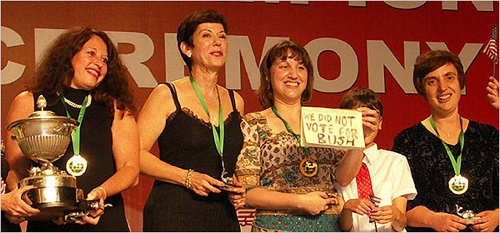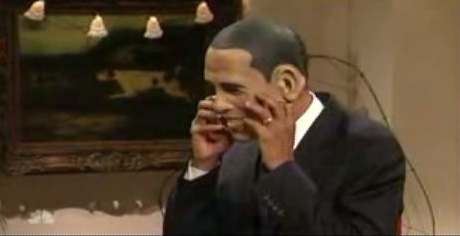Notes
Bridge World In An Uproar
Here’s the photo of the “incident” that “has the bridge world in an uproar.”
The image shows America’s women’s team members (l to r) Jill Levin, Jill Meyers, Debbie Rosenberg and Irina Levitina during the award ceremony following their victory in the world championships last month in Shanghai.
Here’s the article link for background on the punishments being levied; what the world bridge organizational ground rules are for brandishing political communications scribbled on the back of a menu; and comments, by the players, about the atmosphere at the competition, which was described as less warm toward the Americans than during previous tournaments, with a lot of anti-war, anti-torture and anti-Bush sentiment being expressed.
In my mind, the biggest deal about this image — photographed during the singing of “The Star Spangled Banner” while several team members were waving small American flags — is why it’s a big deal at all.
Debbie Rosenberg, the one holding the sign, wrote that the action was inspired by the right of Americans to dissent, and as a commentary against America’s current brand of patriotism, which equates criticism with treason. How ironic, then, that this gesture should come back and undercut these players for exercising that right.
I understand how the women were shocked by the reaction. The visual data seems to back up Ms. Greenberg’s statement that she put up the sign “in response to questions from players from other countries.” Far from attempting to make a larger statement — I see no trying to make eye contact with the cameras or hoisting the sign aloft– it seems the women (in directed gazes with the audience) were simply trying to communicate with their assembled international peers.
What is most indicative of this intent is the style of the message. Rather than an attack or a proclamation, the comment involves the telegraphing of political compatibility through the personal quality of a shared confidence. (Consequently, I assume the smiles mirror the acknowledgment, and feelings of increased warmth and acceptance — and the appreciation of the humor — they are receiving from the audience. (This is less a direct put down of the President than it is a larger declaration of commonality, just like confirming: “Yes, we too don’t like peas.”)
Unfortunately, the photo — now out in the public sphere — can only make these women look worse. The new problem has to do with perceived affect. As explained in the article, the idea of the scribbled sign was a spontaneous thing, intended mostly for levity. Because they’re laughing, though — sheepishly, I assume, more than anything else — the tendency is to read these expressions as mocking, which — in a converse effect — seems more disrespectful than if the women appeared morally indignant.
And then, there is one more thing about the photo which contributes subliminally to the suggestion, made by the article, that this gesture is somehow analogous to the attack on Bush by the Dixie Chicks in 2003. In the random way that the players are situated, the word “CEREMONY” in the background, like a perverse subtext, seems to read like: “ACRIMONY.”
(image: swangames.com by nytimes.com. Shanghai. October 2007)



Reactions
Comments Powered by Disqus